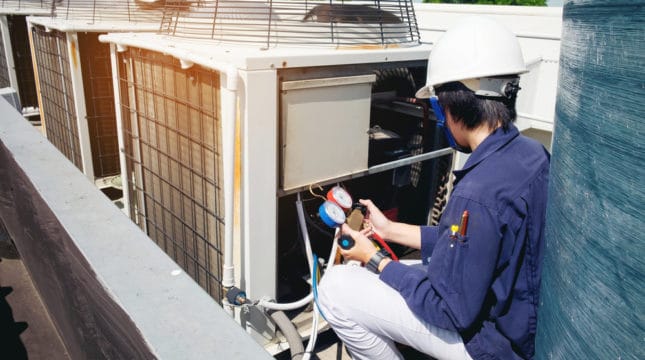Oregon HVAC licensing requirements for contractors
To operate in Oregon as an HVAC contractor, you must get a license. These come in two varieties:
- The Commercial and Residential Contractor License (issued by the Oregon Construction Contractors Board)
- The Limited Maintenance Specialty Contractor – HVAC/R License (issued by the Oregon Building Codes Division)
Both licenses will allow you to operate under your own license to assess and satisfy your customer’s HVAC needs, assuming you have acquired the necessary HVAC technical knowledge.
Commercial and residential contractor license
Oregon requires all people working in construction, building or improving real property to acquire a license with the Oregon Construction Contractors Board (CCB). HVAC is one of the fields that require such licensing.
Getting a CCB license is complex and can take up to eight weeks to finish. Here’s a high-level overview of the process:
- Complete a 16-hour pre-license training course and pass the licensing exam.
- Select your endorsement type (structure types).
- Submit your corporation, LLC and business name.
- Submit a CCB surety bond in the required amount(s).
- Submit proof of general liability insurance (amount depends on endorsement type).
- Obtain workers’ compensation insurance if you will be hiring employees.
- Obtain other employer account numbers (example: state and federal tax numbers).
- Complete an online application.
- Submit your application.
Visit the Oregon CCB website for full instructions.
Limited maintenance specialty contractor – HVAC/R license
A limited maintenance specialty contractor HVAC-R can install, maintain and replace commercial and industrial electrical equipment that processes fuel or other types of energy to generate power, heating or cooling.
This license does not require HVAC professionals to pass an exam. Instead, they must apply for the credential through the Building Codes Division (BCD). The license costs $75 and must be renewed after three years. HVAC professionals working under this license may only do work within their signing supervisors’ license restrictions.
Important: The limited maintenance specialty contractor (HVAC/R) credential allows licensees to perform work that falls within an approved scope of work. The BCD website has further details.
Here’s more information on earning an Oregon HVAC license:
Prerequisites
- Register the business name with the Secretary of State.
- Hold an active Construction Contractor Board (CCB) license.
- Employ an appropriate full time signing supervisor for the license chosen.
Required documentation
- Completed application with fee
- License number(s) and business name of any licenses held with the State of Oregon Building Codes Division
- The license number and signature of signing supervisor
- Licensee’s CCB number
Insurance requirements for an Oregon HVAC license
If you plan to work as an HVAC contractor, you must not only register with the state but also meet Oregon’s business insurance requirements.
Workers’ Compensation insurance
If you plan to hire employees (even part-time), you must also purchase worker’s compensation insurance. This policy can help protect you and your employers in the event of a work-related injury or illness.
The general rule for worker’s compensation insurance is that all Oregon HVAC licensed contractors must have worker’s compensation coverage. Exempt employers — i.e., those without employees — don’t need coverage. Non-exempt contractors, defined as businesses that hire or lease workers, must show evidence of having purchased protection.
However, in some cases, family-owned HVAC businesses are exempt from fulfilling worker’s compensation requirements. These cases include:
- Partnerships in which all partners are family members
- Corporations in which all corporate officers are family members
- Limited liability companies in which all LLC members are family members
If your Oregon HVAC contracting firm is not exempt from the state’s worker’s compensation requirements, you must supply the following data when submitting your license application:
- Your workers’ compensation insurer’s name and your policy number
- If you self-insure your workers’ compensation coverage, your WCVD compliance number
- Your combined Oregon Employment Department and Department of Revenue business identification number (BIN)
- Your Internal Revenue Service employer identification number (EIN) or another federal identification number
Refer to the CCB website for further details about workers’ compensation requirements.
Learn more about workers’ compensation for contractors.
General Liability insurance
As an HVAC contractor, you must have general liability insurance to mitigate your third-party property damage and bodily injury financial risks. This coverage can help cover costs related to common risks that many businesses face, such as:
- Slip-and-fall injuries
- Other injuries related to your business, excluding employees
- Damage to someone else’s property
- Accusations of libel, slander or copyright infringement
Oregon requires more or less general liability coverage depending on your specific HVAC contractor license. Check with the Construction Contractors Board for required coverage limits for various licenses.
Learn more about general liability insurance for contractors.
Commercial Property insurance
Commerical property coverage helps cover damage to your company-owned building, equipment or inventory.
Business Owner’s Policy
A business owner’s policy, or BOP insurance, provides broad coverage of general liability and commercial property policies combined in a single, cost-efficient bundle. It can help cover damage that you or your employees may accidentally cause to another person’s property and help protect your business equipment in the event of a fire or other covered event.
Tools and Equipment insurance
Tools and equipment insurance can help reimburse you for lost or damaged equipment. Insuring your equipment means your return to full productivity should be faster than if you were uninsured.
Commercial Auto insurance
Commercial auto coverage helps cover you for collision or other damage to your business car or truck or for damages or injuries a third party suffered due to your or an employee’s negligence.
HVAC technician licensing requirements
If you don’t plan to become an HVAC contractor, you can enter the field as an individual technician. Two license options are available:
- Limited Energy Technician Class A: With this license, you can work on various limited-energy systems, including communications (paging, intercoms), signaling (fire alarms and security) and specialized control systems (HVAC and boilers).
- Limited Energy Technician Class B: This license is the same as the Class A license, except it doesn’t allow work on signaling systems. If you never expect to work on equipment other than HVAC, this license should suffice.
Either of these licenses will qualify you to work on HVAC systems that are 100 volt-amperes or less as long as you work under one of the two contractor types discussed in the prior section or for a single employer in an industrial setting.
1. HVAC technician bond and insurance requirements
HVAC technicians don’t need to post a bond or buy general liability insurance. The contractor or employer for whom they work will provide these risk-management resources.
2. Work experience and testing requirements
To pursue an HVAC technician career, you must first gain field experience. The state of Oregon requires an apprenticeship or training programs of some kind, either through a trade union or other organization. Visit the Oregon Bureau of Labor & Industries for a list of approved apprenticeship programs.
Once you complete an official apprenticeship, you will have fulfilled the state’s license experience requirement. Alternatively, you can pursue your own apprenticeship by working for a licensed contractor or employer that maintains its own HVAC systems. If you follow this path, a Class A apprentice must prove a minimum of 6,000 hours of experience and a minimum of 432 hours of classroom training.
Similarly, a Class B application must submit at least 4,000 hours of experience and 288 hours of classroom or related job training.
After you complete a formal or informal HVAC apprenticeship program and prove that you fulfilled the experience requirement, you can apply for your license. This involves submitting an application, selecting a testing site, and paying an application fee (currently $50).
3. How long does it take to get licensed?
Based on the stated experience requirements, license completion estimates are as follows:
- For Limited Energy Technician Class A applicants (6,000 experience hours): three to four years.
- For Limited Energy Technician Class B applicants (4,000 experience hours): two to three years.
If you only plan to work part-time, getting licensed could take substantially longer.
4. HVAC technician license renewal and continuing education requirements
You must renew your HVAC technician every three years. At renewal time, you must prove that you completed 8 hours of continuing education to keep your knowledge current.
Oregon EPA Section 608 Certification
The Environmental Protection Agency (EPA) requires all HVAC technicians who work on refrigeration systems to obtain EPA certification. Oregon HVAC technicians must pass an exam with a minimum score of 70%. The exam fee is $120.
The Oregon Air Conditioning Contractors Association provides several resources to help HVAC technicians and contractors obtain their EPA certification under Section 608 of the Clean Air Act.





